Oracle JDK7 bug 发现、分析与解决实战
本文首发于 vivo互联网技术 微信公众号
链接: https://mp.weixin.qq.com/s/8f34CaTp--Wz5pTHKA0Xeg
作者:vivo 官网商城开发团队
众所周知,Oracle JDK 是 Java 语言的绝对权威,很多时候 JDK 与 Java 语言近似一个概念。但我们始终要保持实事求是的精神,敢于质疑。本文记录了一次线上troubleshoot 实战,包含问题分析、解决并提交 Oracle JDK bug 的核心过程。
一、背景现象


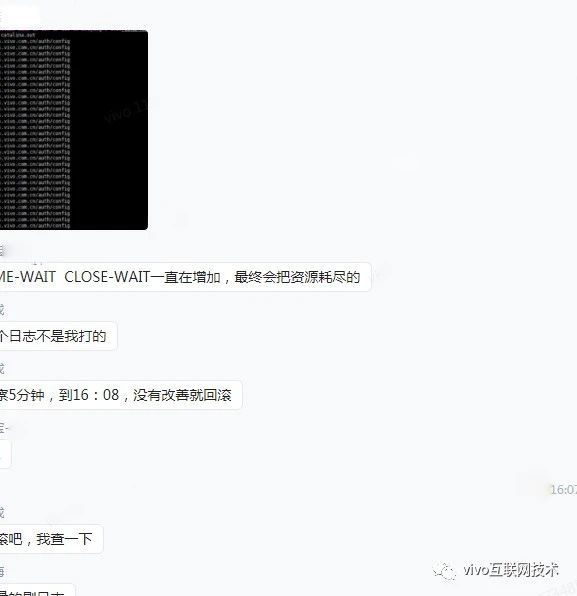
总之 就是某系统上线后 CLOSE_WAIT数量随着时间增加而大量增加,持续触发多个告警。
二、分析定位过程
部署了一个节点,用来复现之前出现的问题。
Step1 问题聚焦
先查看到底是哪些IP之间的连接产生了大量CLOSE_WAIT,另外系统还会涉及调第三方,总之要确认连接建立的双方。
执行命令:
netstat -np | grep tcp|grep "CLOSE_WAIT"
结果:
(ps:xxx、yyy、zzz 均无含义,基于信息安全考虑,屏蔽掉 ip)。
tcp 3547 0 10.107.17.xxx:34602 yyy.12.230.115:443 CLOSE_WAIT 19819/java
tcp 38 0 10.107.17.xxx:59088 yyy.12.230.115:443 CLOSE_WAIT 19819/java
tcp 38 0 10.107.17.xxx:58028 yyy.12.230.115:443 CLOSE_WAIT 19819/java
tcp 38 0 10.107.17.xxx:51962 yyy.12.230.115:443 CLOSE_WAIT 19819/java
tcp 3563 0 10.107.17.xxx:46962 yyy.12.230.115:443 CLOSE_WAIT 19819/java
tcp 38 0 10.107.17.xxx:34608 yyy.12.230.115:443 CLOSE_WAIT 19819/java
tcp 38 0 10.107.17.xxx:46496 yyy.12.230.115:443 CLOSE_WAIT 19819/java
tcp 38 0 10.107.17.xxx:50774 yyy.12.230.115:443 CLOSE_WAIT 19819/java
tcp 38 0 10.107.17.xxx:59904 yyy.12.230.115:443 CLOSE_WAIT 19819/java
tcp 38 0 10.107.17.xxx:40208 yyy.12.230.115:443 CLOSE_WAIT 19819/java
tcp 38 0 10.107.17.xxx:41064 yyy.12.230.115:443 CLOSE_WAIT 19819/java
tcp 38 0 10.107.17.xxx:36994 yyy.12.230.115:443 CLOSE_WAIT 19819/java
tcp 3547 0 10.107.17.xxx:45080 yyy.12.230.115:443 CLOSE_WAIT 19819/java
tcp 6235 0 10.107.17.xxx:60966 yyy.12.230.115:443 CLOSE_WAIT 19819/java
tcp 38 0 10.107.17.xxx:56178 yyy.12.230.115:443 CLOSE_WAIT 19819/java
tcp 3547 0 10.107.17.xxx:39922 yyy.12.230.115:443 CLOSE_WAIT 19819/java
tcp 38 0 10.107.17.xxx:43270 yyy.12.230.115:443 CLOSE_WAIT 19819/java
tcp 38 0 10.107.17.xxx:40926 zzz.202.32.242:443 CLOSE_WAIT 19819/java
tcp 38 0 10.107.17.xxx:44472 yyy.12.230.115:443 CLOSE_WAIT 19819/java
tcp 2891 0 10.107.17.xxx:43036 zzz.202.32.241:443 CLOSE_WAIT 19819/java
........
........
tcp 38 0 10.107.17.xxx:33472 yyy.12.230.115:443 CLOSE_WAIT 19819/java
tcp 38 0 10.107.17.xxx:51976 yyy.12.230.115:443 CLOSE_WAIT 19819/java
tcp 38 0 10.107.17.xxx:57788 yyy.12.230.115:443 CLOSE_WAIT 19819/java
tcp 38 0 10.107.17.xxx:35638 yyy.12.230.115:443 CLOSE_WAIT 19819/java
tcp 38 0 10.107.17.xxx:43778 yyy.12.230.115:443 CLOSE_WAIT 19819/java
tcp 38 0 10.107.17.xxx:46418 yyy.12.230.115:443 CLOSE_WAIT 19819/java
tcp 38 0 10.107.17.xxx:49914 yyy.12.230.115:443 CLOSE_WAIT 19819/java
tcp 38 0 10.107.17.xxx:49258 yyy.12.230.115:443 CLOSE_WAIT 19819/java
tcp 38 0 10.107.17.xxx:48718 yyy.12.230.115:443 CLOSE_WAIT 19819/java
tcp 38 0 10.107.17.xxx:51480 yyy.12.230.115:443 CLOSE_WAIT 19819/java
tcp 38 0 10.107.17.xxx:59816 yyy.12.230.115:443 CLOSE_WAIT 19819/java
tcp 38 0 10.107.17.xxx:49266 yyy.12.230.115:443 CLOSE_WAIT 19819/java
tcp 38 0 10.107.17.xxx:50246 yyy.12.230.115:443 CLOSE_WAIT 19819/java
tcp 38 0 10.107.17.xxx:39324 yyy.12.230.115:443 CLOSE_WAIT 19819/java
总之:
yyy.12.230.115
zzz.202.32.241
zzz.202.32.241
这个三个IP是导火索。
Step2 问题分析
这三个IP具体是谁?具体是请求了哪个接口?
暂时无法直接获知!最直接的导火索暂时断了线索。接着从侧面开始查看更多信息,
- JVM信息
外部资源、线程 什么的都看了,未发现明显异常
- 抓包
要抓包获取更多线索了。对于很久没有碰过TCP层,有些吃力。
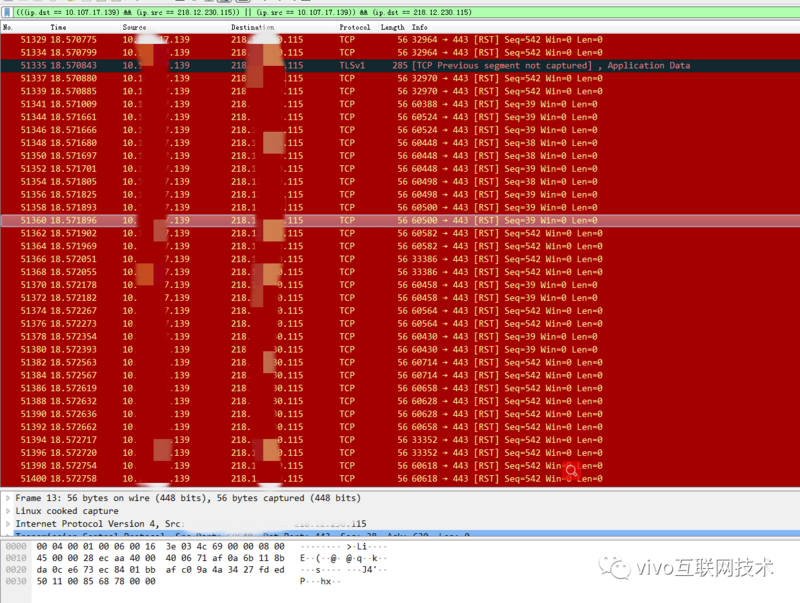
得到线索:发现大量的RST
那么是什么操作会导致CLOSE_WAIT呢?什么样的连接导致大量RST呢(可参考RST通常原因)?
Step3 代码分析定位
运维大佬的协助查询,得知这三个IP是图片CDN服务。
至此,可以定位到具体代码逻辑,图片CDN请求可以排查代码。
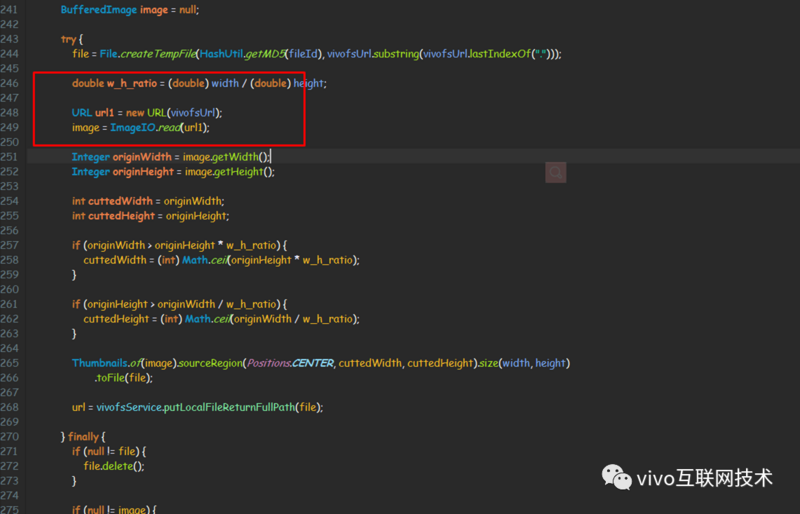
仔细分析这部分源码后,推测因为服务器 发起 URL请求,请求不存在,导致抛出异常,但是JDK中却没有地方关闭Socket。
javax.imageio.read(URL)
/**
* Returns a <code>BufferedImage</code> as the result of decoding
* a supplied <code>URL</code> with an <code>ImageReader</code>
* chosen automatically from among those currently registered. An
* <code>InputStream</code> is obtained from the <code>URL</code>,
* which is wrapped in an <code>ImageInputStream</code>. If no
* registered <code>ImageReader</code> claims to be able to read
* the resulting stream, <code>null</code> is returned.
*
* <p> The current cache settings from <code>getUseCache</code>and
* <code>getCacheDirectory</code> will be used to control caching in the
* <code>ImageInputStream</code> that is created.
*
* <p> This method does not attempt to locate
* <code>ImageReader</code>s that can read directly from a
* <code>URL</code>; that may be accomplished using
* <code>IIORegistry</code> and <code>ImageReaderSpi</code>.
*
* @param input a <code>URL</code> to read from.
*
* @return a <code>BufferedImage</code> containing the decoded
* contents of the input, or <code>null</code>.
*
* @exception IllegalArgumentException if <code>input</code> is
* <code>null</code>.
* @exception IOException if an error occurs during reading.
*/
public static BufferedImage read(URL input) throws IOException {
if (input == null) {
throw new IllegalArgumentException("input == null!");
}
InputStream istream = null;
try {
//此处,建立TCP连接!并且直接获取流,因为流数据不存在,进入cache块,抛出!
istream = input.openStream();
} catch (IOException e) {
throw new IIOException("Can't get input stream from URL!", e);
}
ImageInputStream stream = createImageInputStream(istream);
BufferedImage bi;
try {
bi = read(stream);
if (bi == null) {
stream.close();
}
} finally {
istream.close();
}
return bi;
}
可以看到JDK并没有关闭 ImageIO.read(url) 代码中封装的Socket连接!CDN会请求超时关闭导致服务器处于CLOSE_WAIT?限于网络经验有限,并不能100%确认我的想法。所以模拟下吧。
Step4 复现与模拟
根据系统业务源码,快速模拟:
public static void main(String[] args) throws InterruptedException {
ExecutorService ex = Executors.newFixedThreadPool(100);
for (int i = 0; i < 5000; i++) {
ex.execute(task());
}
}
/**
* @throws IOException
* @throws MalformedURLException
*/
private static Runnable task() {
return new Runnable() {
@Override
public void run() {
// domain must exists,but file doesnot.
String vivofsUrl = "https://vivobbs.xx.yy.zz/wiwNWYCFW9ieGbWq/20181129/3a2adfde12cd328d81f965088890eeffff.jpg";
File file = null;
BufferedImage image = null;
try {
file = File.createTempFile("abc", "jpg");
URL url1 = new URL(vivofsUrl);
image = ImageIO.read(url1);
} catch (Throwable e) {
e.printStackTrace();
} finally {
if (null != file) {
file.delete();
}
if (null != image) {
image.flush();
image = null;
}
}
}
};
}
抓包
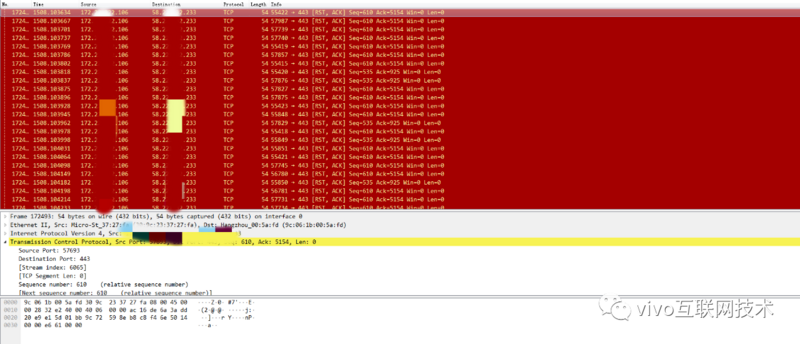
TCP查看
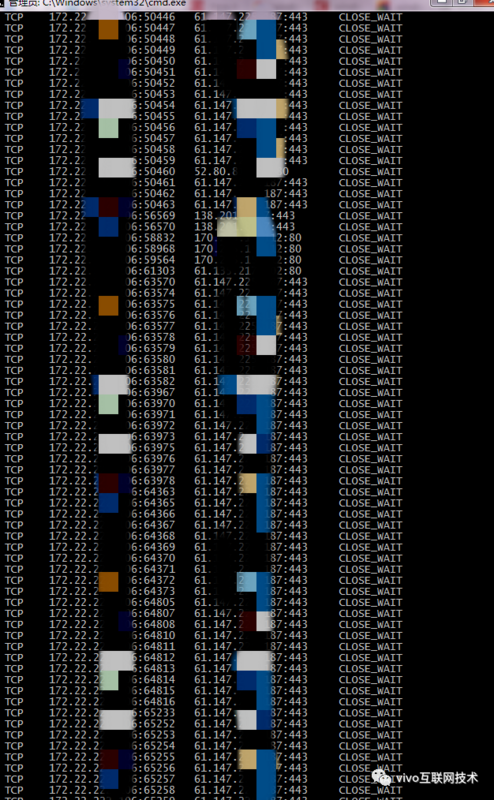
问题复现!
Step5 沟通后提报bug
report 给Oracle。
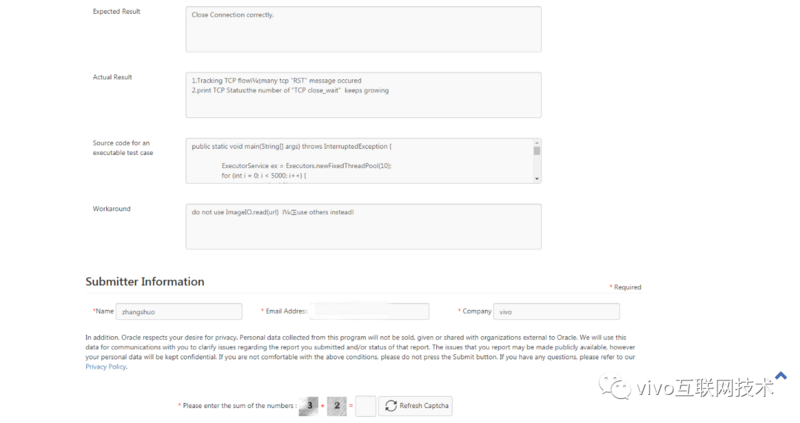
三、Oracle沟通
提单之后,Oracle跟我联系沟通。截取部分邮件内容,仅供参考。
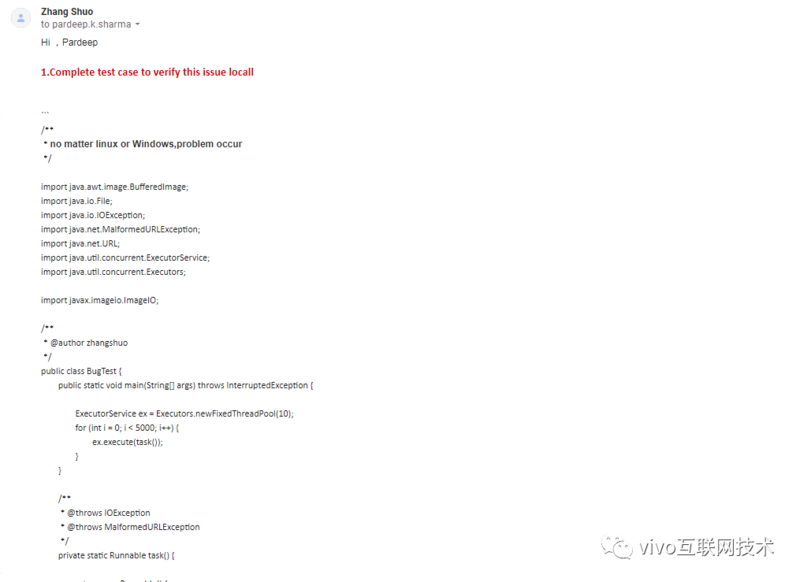
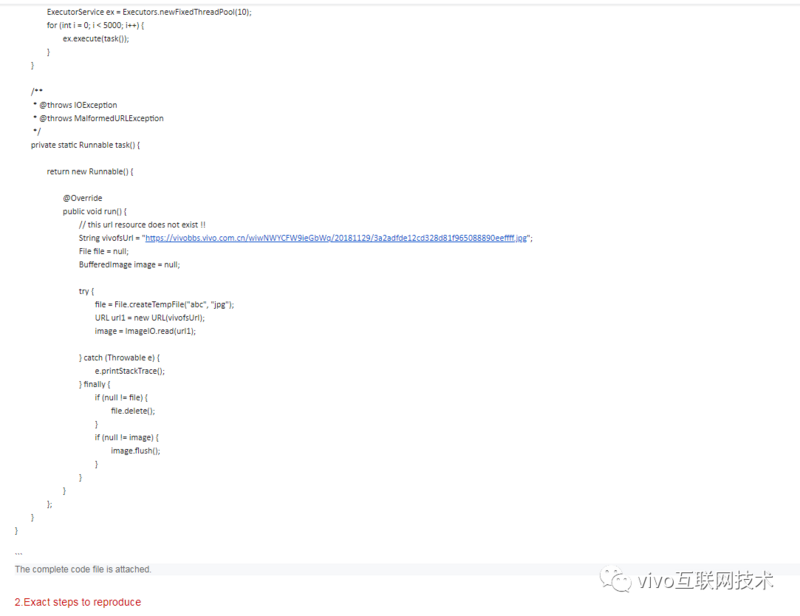
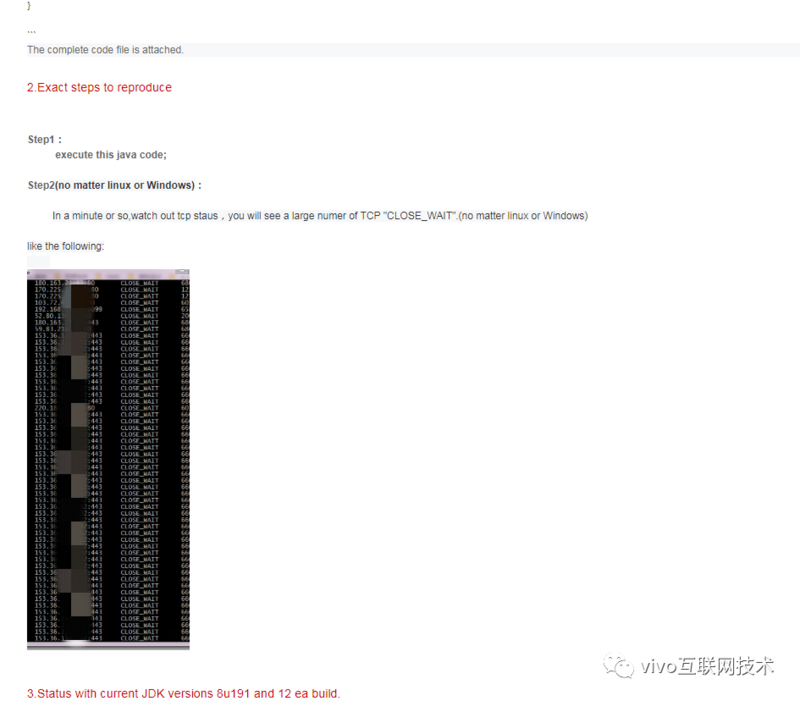


已被采纳
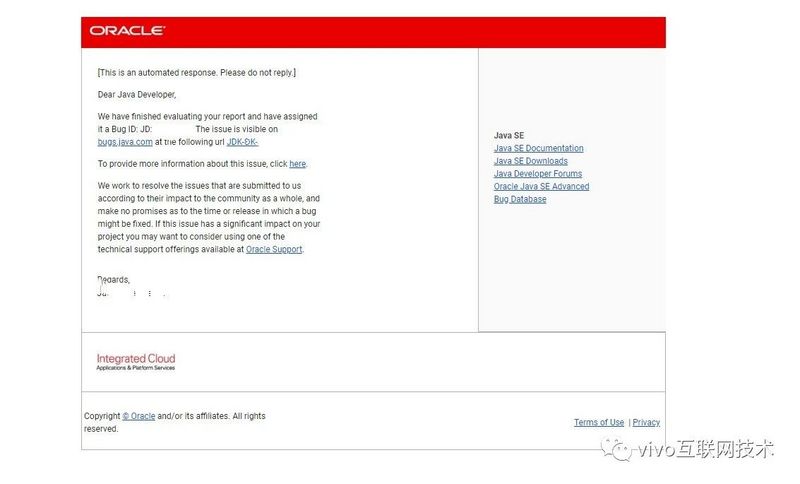
四、疑点与不足
TCP状态机的流转不够熟悉透彻。导致一些问题不能从TCP状态机分析推理,知识的全面精通需要不断提高。
更多内容敬请关注 vivo 互联网技术 微信公众号
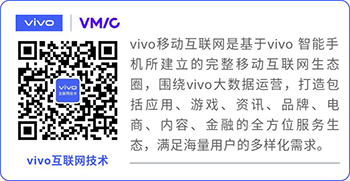
注:转载文章请先与微信号: Labs2020 联系。











![[HBLOG]公众号](https://www.liuhaihua.cn/img/qrcode_gzh.jpg)

